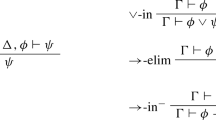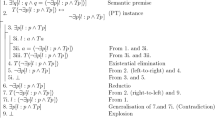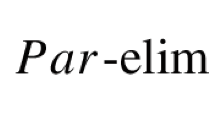Abstract
We present a strategy to dissolve semantic paradoxes which proceeds from an explanation of why paradoxical sentences or their definitions are semantically defective. This explanation is compatible with the acceptability of impredicative definitions, self-referential sentences and semantically closed languages and leaves the status of the so-called truth-teller sentence unaffected. It is based on platitudes which encode innocuous constraints on successful definition and successful expression of propositional content. We show that the construction of liar paradoxes and of certain versions of Curry’s paradox rests on presuppositions that violate these innocuous constraints. Other versions of Curry’s paradox are shown not to be paradoxical at all once their presuppositions are made explicit. Part of what we say rehearses a proposal originally made by Laurence Goldstein in 1985. Like Goldstein we dispose of certain paradoxes by rejecting some of the premises from which they must be taken to proceed. However, we disagree with his more recent view that the premises to be rejected are neither true nor false.
Similar content being viewed by others
References
Barwise J., Etchemendy J. (1987).: The Liar. An Essay on Truth and Circularity. Oxford, Oxford University Press
Chomsky N. (1957). Syntactic Structures. The Hague, Mouton & Co
Clark M. (2002). Paradoxes from A to Z. London, Routledge
Frege, G.: 1976, Wissenschaftlicher Briefwechsel, in G. Gabriel et al. (eds.), Meiner Verlag, Hamburg
Goldstein L. (1985). The Paradox of the Liar – A Case of Mistaken Identity. Analysis 45: 9–13
Goldstein L. (1986a). Epimenides and Curry. Analysis 46: 117–121
Goldstein L. (1986b). False Stipulation and Semantical Paradox. Analysis 46:192–195
Goldstein L. (2001). Truthbearers and the Liar – A Reply to Alan Weir. Analysis 61: 115–126
Goldstein L. (2004). The Barber, Russell’s Paradox, Catch22, God and More: A Defence of a Wittgensteinian Conception of Contradiction. In: Priest G. et al. (eds) The Law of NonContradiction. Oxford, Oxford University Press, pp. 295–313
Greenough P. (2001). Free Assumptions and the Liar Paradox. American Philosophical Quarterly 38: 115–135
Herzberger H. (1970). Paradoxes of Grounding in Semantics. The Journal of Philosophy 67: 145–167
Kripke S. A. (1975). Outline of a Theory of Truth. The Journal of Philosophy 72: 690–716
Priest G. (2002). Beyond the Limits of Thought, 2nd edition. Oxford, Oxford University Press
Rosenkranz S. (2002). Objectivity and Realism. Meeting the Manifestation Challenge. Heidelberg, Synchron Publishers
Russell, B.: 1908, ‘Mathematical Logic as Based on the Theory of Types’, American Journal of Mathematics 30, 222–262, reprinted in R. C. Marsh (ed.), Logic and Knowledge, Allen and Unwin, London, 1956, pp. 59–102
Sainsbury R. M. (1995) Paradoxes, 2nd edition. Cambridge, Cambridge University Press
Slater H. (2004). Tarski’s Hidden Assumption. Ratio (new series) 17: 84–89
Smith M. (1994). The Moral Problem. Oxford, Blackwell
Sorensen R. (2001). Vagueness and Contradiction. Oxford, Oxford University Press
Tarski A. (1944/45). The Semantic Conception of Truth and the Foundations of Semantics. Philosophy and Phenomenological Research 4: 341–375
Tarski A. (1956). The Concept of Truth in Formalized Languages. In: Tarski A. (eds) Logic, Semantics, Metamathematics. New York, Clarendon, pp. 152–278
Wittgenstein, L.: 1953, Philosophical Investigations, in E. Anscombe and R. Rhees (eds.), Blackwell, Oxford
Acknowledgements
We would like to thank members of the LOGOS research group, Universitat de Barcelona, and the DFG network on a priori justification for helpful comments. Special thanks go to José Díez, Manuel García-Carpintero, Patrick Greenough, Max Kölbel, José Martínez, Wolfgang Spohn, Niko Strobach, Christian Suhm, and two anonymous referees.
Author information
Authors and Affiliations
Corresponding authors
Rights and permissions
About this article
Cite this article
Rosenkranz, S., Sarkohi, A. Platitudes against Paradox. Erkenntnis 65, 319–341 (2006). https://doi.org/10.1007/s10670-006-9008-z
Received:
Accepted:
Published:
Issue Date:
DOI: https://doi.org/10.1007/s10670-006-9008-z




